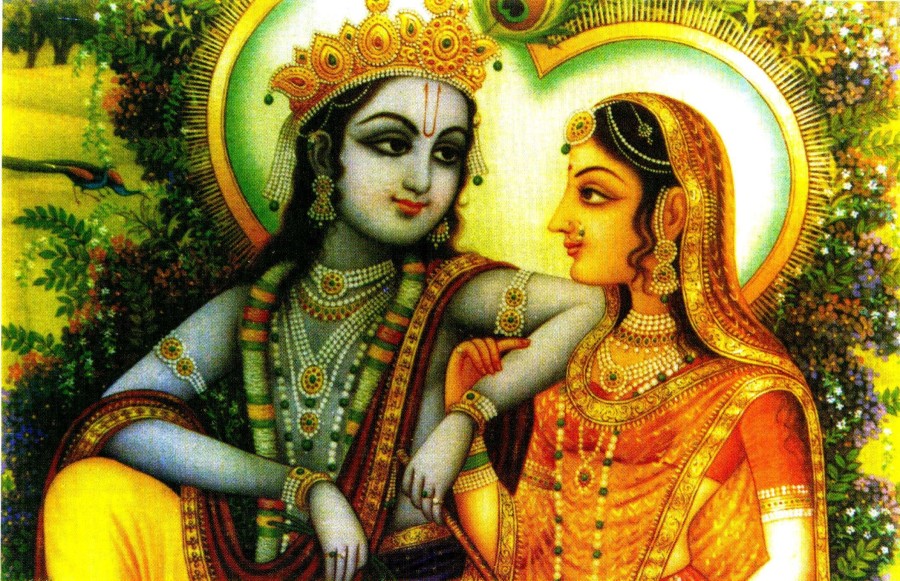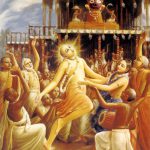 by Swami B.V. Tripurari
by Swami B.V. Tripurari
True spirituality involves loving all beings and nature as well, but within the spectrum of spirituality people prefer and pursue different realizations. Gaudiya Vaishnavas practice devotion to Krishna because this manifestation of God represents the heart of divinity—the romantic love life of the Absolute; they want to be involved in this unique transcendent experience.
Other transcendentalists (monists) believe there is ultimately no distinction between the individual soul and God. They focus their attention on the all-pervasive feature of divinity envisioning other manifestations of God as partial expressions of an ineffable Absolute—Brahman. Their desire is to merge the self (atma) into oneness with Brahman. Thus, for the monists, there is no love in transcendence per say, as their goal is to experience no sense of any “other,” and thereby no object of love.
As in all true yogic paths, pursuing this realization requires rejecting the exploitation of matter for personal satisfaction. For monists, this gives rise to a broad sense of universal compassion that evolves into an experiential state of eternal, unadulterated being. Vaishnavas also come to the experience of universal compassion and eternality, but while monists cherish eternal “being,” Vaishnavas cherish eternal loving. In short, monists love to exist, whereas Vaishnavas exist to love.
Bhagavad-gita says, yoginam api sarvesam, “Of all yogis, one who abides in me (Krishna) with full faith, worshiping me in devotion, is most intimately united with me and considered the best of all.” This verse speaks of dynamic oneness with God; oneness in devotion and love that allows for the object of love (Krishna) and the lover (the self/atma) to exist in simultaneous union and difference. This post-liberated state known as rasa, love in transcendence, is the be-all and end-all of Vaishnavism.
Monists may appear universal when they express equal affinity for all manifestations of divinity, but this mindset does not lead to pure love of Krishna (prema). The path to prema requires nothing less than single-minded devotion to the perfect object of love—Sri Krishna. This is not the goal of the monists; only Vaishnavas are interested in the pursuit of such love in rasananda—eternal loving ecstasy. This transcendent experience is possible in the fullest sense only in relation to Sri Krishna, who is appropriately known as Rasaraja—the King of Rasa. Those who carefully study Krishna bhakti as compared to paths centered on Buddha, Shiva, Brahma, Durga, or the pursuit of nirvana or spiritual oneness (sayujya-mukti), will know that rasananda is available only in relation to Sri Krishna and his avataras. At the same time, one who properly understands and follows the path of Krishna bhakti will exhibit love everywhere, as kindness to all beings and chanting Krishna nama go hand in hand. Gaudiya Vaishnavas consider these two, chanting and kindness, to be the essence of dharma (sarva dharma sara). They see all Hindu gods and goddesses as manifestations of Krishna’s power and potency, being venerable in that light.
However, we do find that some in the name of Krishna bhakti appear to be hardhearted, showing little in the way of love for humanity or nature, and may even exhibit a tendency to vilify other gods and goddesses. Such misrepresentation of Krishna bhakti is often the result of an intellectual orientation to devotion in which knowledge (jnana) and detachment (vairagya) override love as the focus of one’s practice. This may also involve a fundamentalist orientation to Krishna bhakti that results in vilifying other Vaishnavas in the name of strict adherence to a misunderstanding of Vaishnava doctrine.
Sri Bhaktivinoda Thakura, the pioneer of the Krishna consciousness movement, addressed such misunderstanding of Vaisnavism when he wrote, “Those who think that devotion to God and kindness to others are exclusive of one another will not be able to cultivate pure devotional service to Krishna. Their activities are only a semblance of devotion.”










